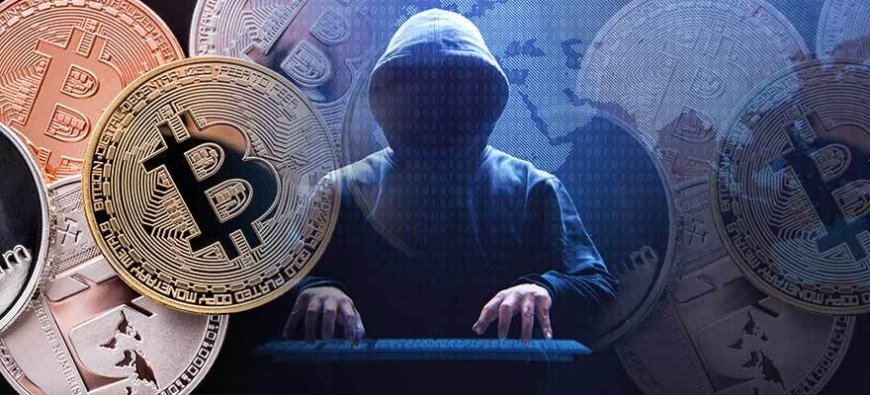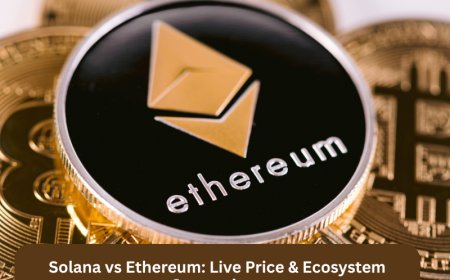Crypto Wallet vs Exchange: What's the Difference and Which Should You Use?
This article explains the key differences between a crypto wallet and a crypto exchange, helping users understand when and why to use each. It highlights the importance of using a top crypto wallet for secure storage and full ownership, while also showing how exchanges are essential for buying and trading cryptocurrencies

As the cryptocurrency market continues to attract new investors in 2025, many beginners find themselves confused by two essential tools in the crypto ecosystem: crypto wallets and exchanges. While both are integral to buying, storing, and managing digital assets, they serve very different purposes. Understanding how they workand when to use eachcan significantly impact your security, flexibility, and overall crypto experience.
In this guide, well break down the key differences between a crypto wallet and an exchange, highlight their pros and cons, and help you decide which one best fits your needs. Well also explore how using a top crypto wallet can elevate your security and put you in full control of your crypto journey.
What Is a Crypto Exchange?
A crypto exchange is a digital marketplace where users can buy, sell, and trade cryptocurrencies like Bitcoin, Ethereum, and thousands of other tokens. There are two main types of exchanges:
-
Centralized Exchanges (CEXs): Platforms like Binance, Coinbase, and Kraken that act as intermediaries between buyers and sellers. These platforms often hold users' funds in custodial wallets.
-
Decentralized Exchanges (DEXs): Peer-to-peer platforms like Uniswap, PancakeSwap, and SushiSwap that allow users to trade directly from their own wallets without a central authority.
Exchanges are typically the starting point for most crypto users. Theyre user-friendly, support fiat deposits, and provide access to a wide variety of cryptocurrencies.
What Is a Crypto Wallet?
A crypto wallet is a tooleither hardware or softwarethat allows you to store, send, and receive cryptocurrency securely. Unlike an exchange account, a crypto wallet doesnt act as a custodian. Instead, it gives you control over your private keys, which are necessary to access and manage your funds on the blockchain.
There are two main types of crypto wallets:
-
Hot Wallets: Connected to the internet; examples include mobile apps and browser extensions.
-
Cold Wallets: Offline devices, like hardware wallets (Ledger, Trezor), designed for long-term storage and maximum security.
Choosing a top crypto wallet ensures a balance between usability and robust security features, including multi-chain support, biometric access, and backup options.
Crypto Wallet vs Exchange: The Key Differences
Lets break down the core differences between wallets and exchanges:
| Feature | Crypto Wallet | Crypto Exchange |
|---|---|---|
| Purpose | Store and manage crypto securely | Buy, sell, and trade cryptocurrencies |
| Ownership | You control the private keys | The platform holds your funds (unless using DEX) |
| Security | Higher (if using a top crypto wallet) | Varies; risk of hacks with custodial wallets |
| Accessibility | 24/7 access to your funds | May be subject to maintenance, withdrawal delays |
| Functionality | Send/receive, stake, connect to dApps | Trading, order books, fiat on-ramp |
| User Control | Full self-custody (non-custodial) | Platform-managed accounts (custodial) |
When to Use a Crypto Exchange
A crypto exchange is ideal for:
-
Buying and Selling Crypto: Exchanges provide the gateway to convert fiat into crypto and vice versa.
-
Trading and Speculation: If youre actively buying and selling to profit from price movements, an exchange is your primary tool.
-
Discovering New Tokens: Exchanges often list a wide variety of altcoins, especially DEXs.
However, leaving your assets on an exchange for too long can be risky. Hacks, regulatory issues, and withdrawal restrictions can put your funds in jeopardy.
When to Use a Crypto Wallet
A crypto wallet is essential for:
-
Secure Storage: A wallet gives you full control over your funds, making it the safest option for long-term holding.
-
Interacting with DeFi and NFTs: You need a wallet to connect to decentralized apps (dApps), stake tokens, or buy NFTs.
-
Making Peer-to-Peer Transfers: Wallets allow you to send and receive crypto directly, without needing third-party approval.
For the best experience, choose a top crypto wallet that offers features like multi-chain support, swap-to-earn rewards, and seamless integration with decentralized platforms.
The Smart Approach: Use Both Together
Rather than choosing one over the other, many crypto users adopt a hybrid strategy:
-
Buy crypto on an exchange.
-
Transfer it to a secure crypto wallet for long-term storage or DeFi use.
-
Return to the exchange only when you need to convert to fiat or make new purchases.
This method combines the convenience of exchanges with the security and control of walletsgiving you the best of both worlds.
How to Choose the Top Crypto Wallet
When selecting a top crypto wallet, look for the following features:
-
Non-custodial: You control your private keys, not the wallet provider.
-
Multi-chain compatibility: Support for Ethereum, BNB Chain, Solana, Bitcoin, and more.
-
Cross-chain swaps: Trade tokens within the wallet without needing an exchange.
-
High-level security: Biometric login, passcode protection, encrypted backups.
-
User-friendly interface: Easy navigation and quick access to features.
-
Integration with DeFi and NFTs: Connect to dApps, stake tokens, and manage collectibles.
Examples of top crypto wallets include hardware wallets like Ledger, mobile apps like Plus Wallet or Trust Wallet, and browser extensions like MetaMask.
Conclusion
In the ever-evolving world of cryptocurrency, understanding the difference between a crypto wallet and an exchange is crucial for anyone looking to invest, trade, or store digital assets securely. While exchanges are great for buying and trading, wallets are essential for securing and managing your crypto independently.
By using both tools wiselyand choosing a top crypto wallet to protect your fundsyou can enjoy the full benefits of blockchain technology without compromising security or control








































